WhatsApp has become the world’s most trusted communication channel, not just for friends and family, but for businesses.
💡In 2025, it’s no longer optional for brands to be available on WhatsApp; it’s an expectation. Yet with rising message volumes and customer demands for 24/7 availability, support teams and sales reps face mounting pressure.
Enter AI-powered WhatsApp automation. The post-ChatGPT boom has brought an explosion of WhatsApp AI tools, but the sheer number of options leaves businesses stuck with one question: Which AI is the best for WhatsApp in 2025?
In this guide, BitBytes unpacks the leading AI tools for WhatsApp — feature by feature. Whether your goal is automating customer support, driving sales conversations, or collecting market insights, we’ll show you how to choose the right solution.
👉 Discover how BitBytes helps businesses bring SaaS and chatbot ideas to life — explore our case studies or connect with our experts today.
➡️ Read the full Agentic WhatsApp case study here »
Table of Contents
The Best WhatsApp AI Tools in 2025 Compared in Detail
At BitBytes, we’ve compared the top WhatsApp AI solutions so you don’t have to. Below is a breakdown of tools categorized by their strengths, pricing transparency, and best-fit scenarios.
| Tool | Best For | Key Features |
|---|---|---|
| Wati | SMB Support Automation | FAQ, CRM, ticketing |
| Zoko | eCommerce Sales | Cart recovery, upsell, Shopify integration |
| Tellephant | Multi-use Flexibility | Campaigns, support, sales mix |
| Yellow.ai | Enterprise Automation | NLU, voice, analytics |
| Twilio + AI | Developer Customization | APIs, AI add-ons |
| BotPenguin / ManyChat | Startup-friendly | Affordable chat automation |
| Freshchat / Intercom | Omni-channel Support | Multi-platform + WhatsApp |
1️⃣ Wati – Best for SMB Support Automation
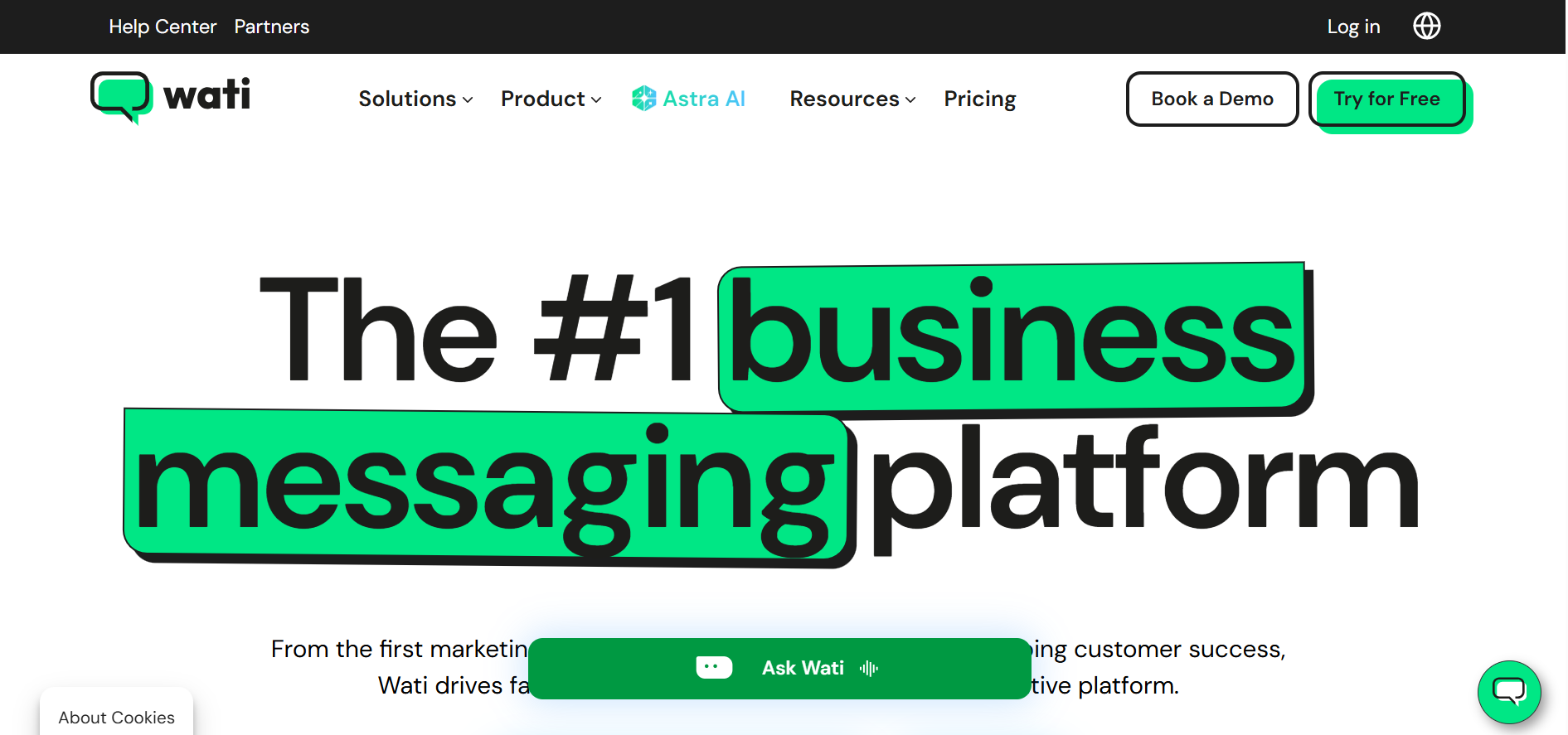
For small and mid-sized businesses, scaling support often feels impossible. Hiring more agents increases costs, while leaving customers waiting risks losing them. Wati is built specifically to solve this problem.
Wati connects directly with the WhatsApp Business API, automating repetitive tasks like FAQs, ticket creation, and CRM updates. It’s simple enough for SMBs to deploy quickly but powerful enough to significantly reduce support workload.
Key Features:
- Instant responses to FAQs.
- CRM integration for context-aware replies.
- Ticketing to escalate complex issues.
- Multi-language support for diverse customer bases.
Pros: Easy setup, budget-friendly, user-friendly dashboards.
Cons: Limited analytics for enterprises that need deep reporting.
Best For: Startups and SMBs looking to handle high volumes of basic queries efficiently without inflating support costs.
2️⃣ Zoko – Sales-Focused for eCommerce
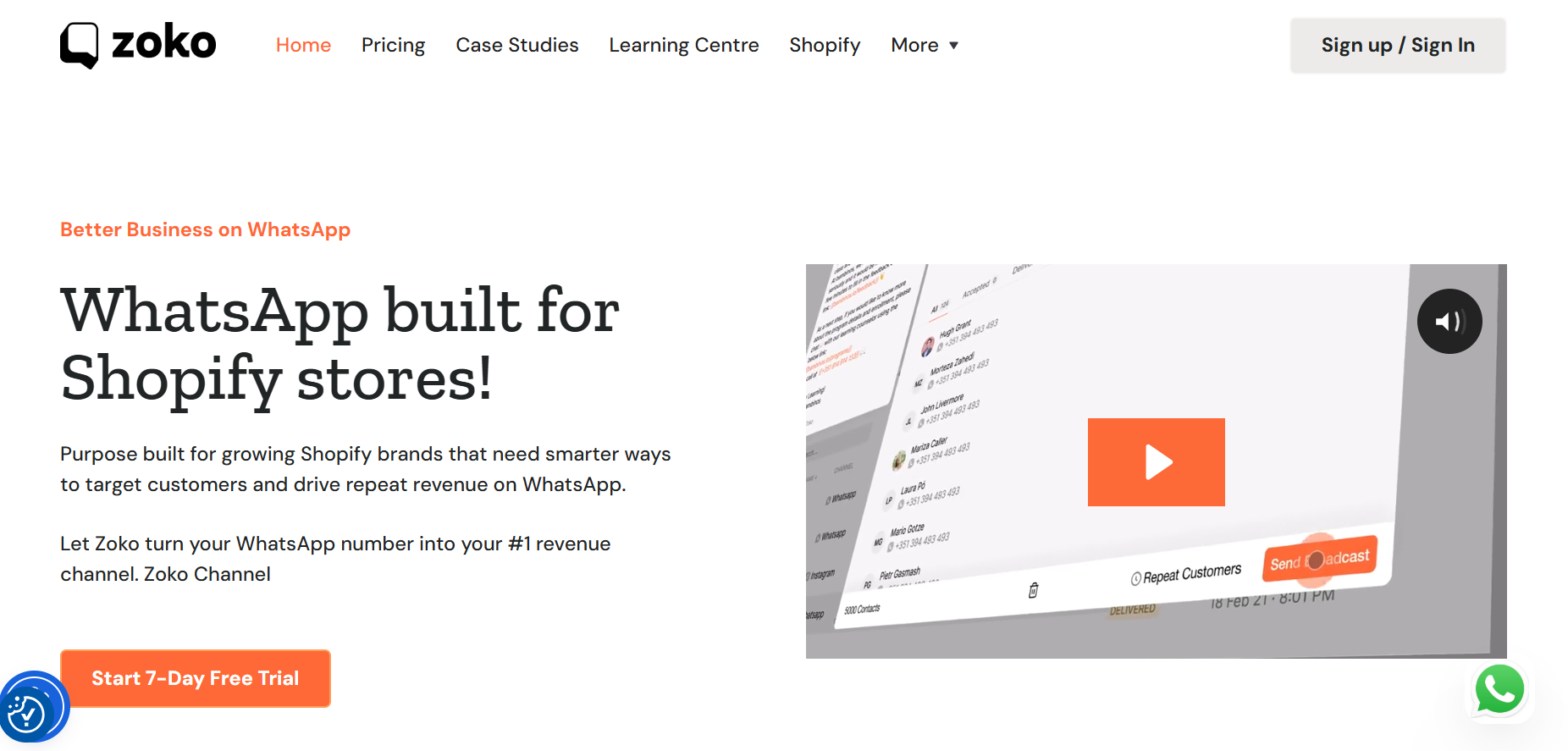
For eCommerce businesses, abandoned carts equal lost revenue. Zoko is built to stop that leakage.
Zoko integrates with Shopify, WooCommerce, and similar platforms to recover carts, upsell products, and extend customer lifetime value (CLV). Its workflows are designed with revenue growth in mind.
Key Features:
- Automated abandoned cart recovery.
- Personalized upsell and cross-sell flows.
- Direct integrations with major eCommerce platforms.
- Broadcast campaigns for launches and promotions.
Pros: Clear revenue impact, strong eCommerce ecosystem support, measurable ROI.
Cons: Limited outside sales and marketing use cases.
Best For: DTC brands, online retailers, and eCommerce managers aiming to boost conversions without expanding headcount.
3️⃣ Tellephant – Flexible, Multi-Use Option
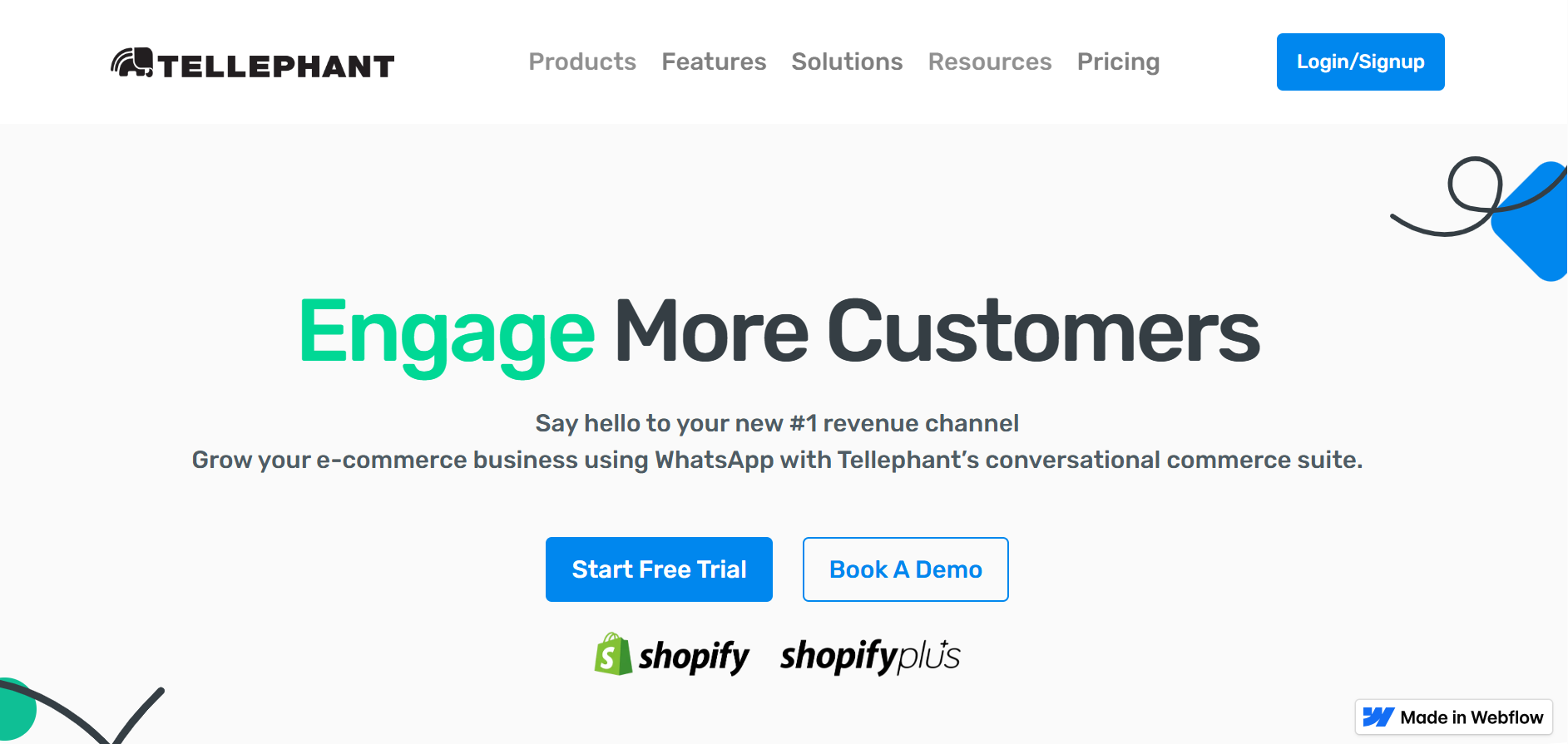
Not every company fits neatly into “support” or “sales.” Tellephant offers flexibility, making it a practical choice for SMBs juggling multiple priorities.
Known as the “Swiss Army knife” of WhatsApp AI, Tellephant combines support, sales, and marketing into one solution.
Key Features:
- Campaign management for promotions.
- Support ticketing and automated replies.
- Sales automation like lead capture and follow-ups.
- Feedback collection and survey workflows.
Pros: Balanced feature mix, accessible pricing.
Cons: Analytics less advanced compared to enterprise tools.
Best For: SMBs and mid-sized companies seeking one platform to handle multiple workflows without heavy investment.
4️⃣ Yellow.ai – Enterprise-Level Intelligence
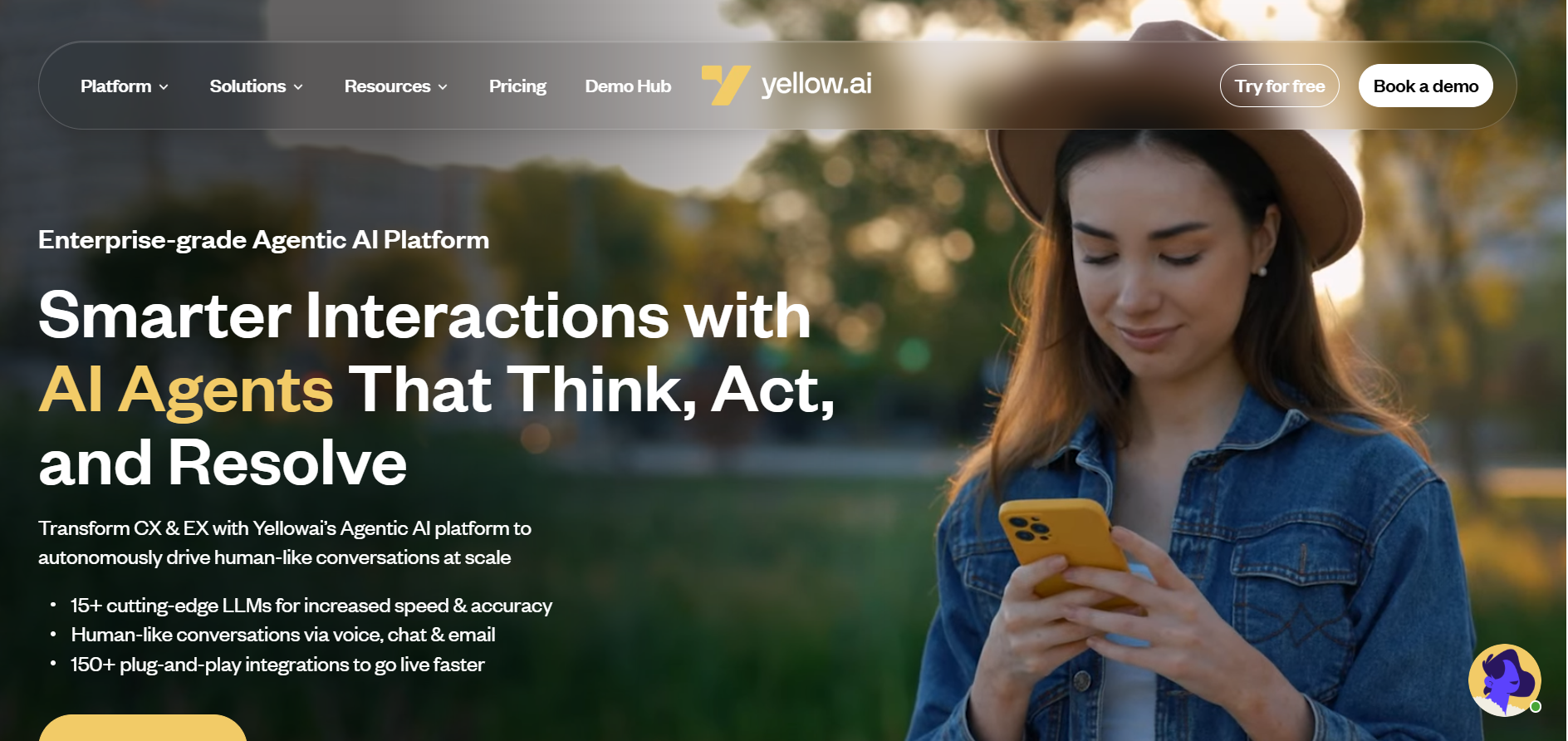
Large organizations demand precision, scale, and multilingual capabilities. Yellow.ai delivers exactly that, positioning itself as an enterprise-ready solution.
Powered by advanced Natural Language Understanding (NLU), Yellow.ai enables hyper-personalized, context-driven conversations across global markets.
Key Features:
- AI memory for contextual replies.
- Multi-language and regional dialect support.
- Advanced analytics dashboards for CX leaders.
- Deep integrations with enterprise CRMs and ERPs.
Pros: Highly intelligent, enterprise-compliant, built for global scale.
Cons: Expensive, with longer setup cycles.
Best For: Corporations and enterprises managing large, multilingual customer bases with complex support and compliance needs.
5️⃣ Twilio + AI Add-ons – Developer-Friendly Customization
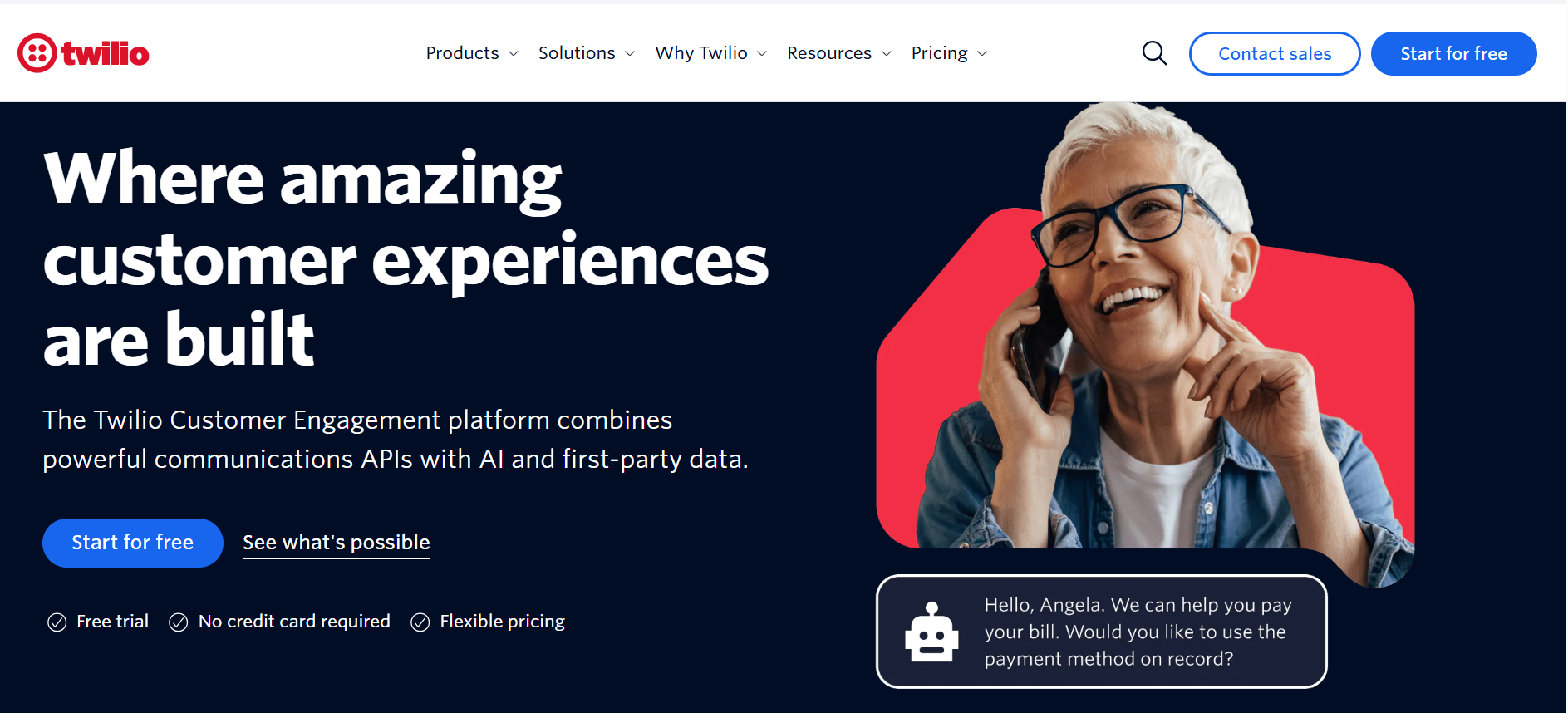
For companies with strong technical teams, Twilio offers unmatched flexibility.
Twilio provides the backbone API, while AI add-ons (like GPT assistants) allow businesses to design fully custom WhatsApp workflows.
Key Features:
- Developer-first workflow design.
- Scalable APIs and infrastructure.
- AI-powered conversational flows.
- Limitless integrations, depending on development resources.
Pros: Fully customizable, reliable, scalable.
Cons: Requires developer expertise; not turnkey.
Best For: Tech-savvy companies that want to create bespoke WhatsApp AI solutions custom to unique needs.
6️⃣ BotPenguin / ManyChat – Startup-Friendly Options
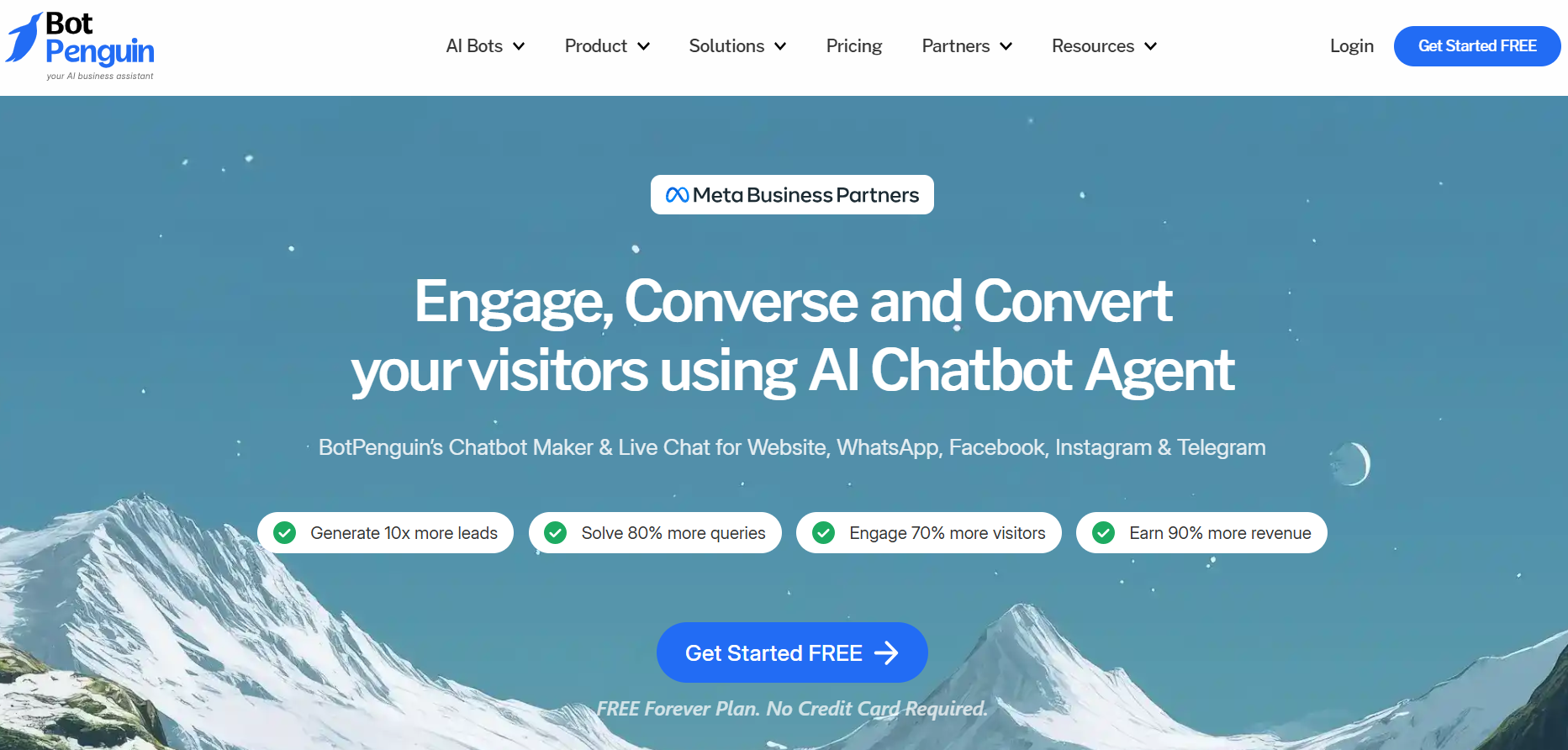
Not every business can start with enterprise AI. BotPenguin and ManyChat provide affordable entry points for startups and lean teams.
These platforms deliver plug-and-play WhatsApp automation with templates for FAQs, lead capture, and engagement campaigns.
Key Features:
- Cost-effective chatbot templates.
- Simple lead generation workflows.
- Broadcast campaigns for offers.
- Basic customer support automation.
Pros: Quick to deploy, budget-friendly, ideal for MVPs.
Cons: Limited customization and scalability.
Best For: Early-stage startups or small online businesses testing WhatsApp automation before scaling.
👉 Click here for BotPenguin price
👉 Click here for ManyChat price
7️⃣ Freshchat / Intercom with WhatsApp Integration – Multi-Channel Coverage
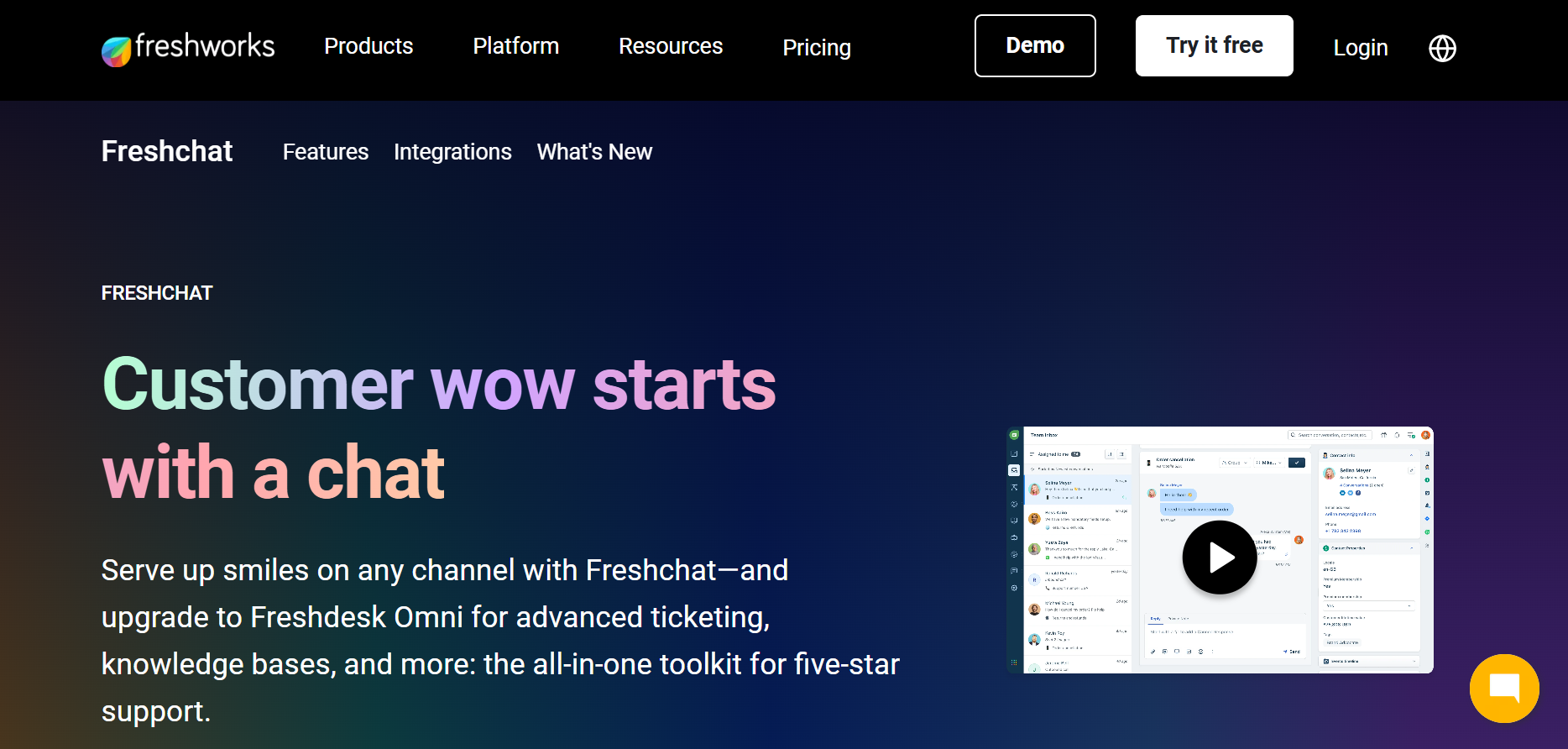
Some businesses don’t just operate on WhatsApp. Freshchat and Intercom integrate WhatsApp into a broader customer engagement strategy.
These platforms unify customer conversations across WhatsApp, email, web chat, and more.
Key Features:
- Unified inbox across channels.
- AI-assisted replies for efficiency.
- Detailed analytics and reporting.
- Collaboration tools for support teams.
Pros: Ideal for omni-channel strategies, robust dashboards.
Cons: Higher cost, may be overkill for WhatsApp-only businesses.
Best For: Mid-sized and enterprise companies managing complex, multi-channel customer interactions.
Niche Tools Worth Exploring in Specific Industries
- Healthcare-focused AI bots → Patient reminders, symptom check-ins.
- Hospitality bots → Instant booking confirmations, guest support.
- Food delivery bots → Order status, real-time feedback.
These niche players might not rival the larger platforms in flexibility but excel in industry-specific workflows.
Breaking Down the Feature-by-Feature Comparison Table
To make the decision easier, here’s a scan-friendly comparison of key WhatsApp AI features across platforms:
| Feature / Tool | Wati | Zoko | Tellephant | Yellow.ai | Twilio + AI | BotPenguin/ManyChat | Freshchat/Intercom |
|---|---|---|---|---|---|---|---|
| Support Automation | ✅ | ✅ | ✅ | ✅ | ⚡ | ✅ | ✅ |
| Sales Workflows | ⚡ | ✅ | ✅ | ✅ | ⚡ | ⚡ | ✅ |
| Research/Feedback | ⚡ | ⚡ | ✅ | ✅ | ⚡ | ⚡ | ✅ |
| Multi-Language | ✅ | ⚡ | ✅ | ✅ | ⚡ | ⚡ | ✅ |
| Integration | ✅ | ✅ | ✅ | ✅ | ✅ | ⚡ | ✅ |
| Pricing Clarity | ✅ | ✅ | ⚡ | ⚡ | Variable | ✅ | ⚡ |
(✅ = Strong | ⚡ = Basic/Available with add-ons)
For non-technical executives, this table highlights at a glance which platforms align best with your primary objective — whether it’s scaling support, driving sales, or gathering research insights.
How BitBytes Helps You Implement the Right WhatsApp AI Solution
Adopting WhatsApp AI can feel overwhelming. That’s where BitBytes comes in. As a trusted custom software development partner, we don’t just point you toward a tool, we design end-to-end solutions that fit your business goals and growth stage.
👉 Here’s how we help businesses turn WhatsApp AI into a real competitive advantage:
1. Strategic Tool Selection
We start by understanding your objectives and customer journey. Whether your priority is support, sales, or research, our team recommends the WhatsApp AI platform that best fits your needs, not just what’s trending.
2. Seamless Integration
A chatbot is only valuable if it works with the systems you already rely on. We connect WhatsApp AI directly into your CRM, eCommerce platform, or internal workflows. The result: no silos, no bottlenecks, just a unified customer experience.
3. Customization and Training
Generic chatbots rarely capture a brand’s voice. BitBytes customizes flows, tone, and automation so your AI reflects your identity. We also train your team to manage AI-human collaboration confidently, making sure smooth handoffs where needed.
4. Scalable Partnership
Your business won’t look the same a year from now, and your WhatsApp AI shouldn’t either. As you grow, we adjust your strategy, add features, and optimize for ROI. We’re not a one-off vendor; we’re a long-term innovation partner.
💡 Think of BitBytes as your “custom software pit crew.” We fine-tune your WhatsApp AI engine so you can stay focused on driving growth.
👉 Request WhatsApp AI Development
Why Businesses in 2025 Can’t Afford to Ignore AI for WhatsApp
WhatsApp has evolved into the world’s most trusted business communication channel, with billions of users across every major market.
▶️ The numbers are staggering: response rates are up to 5x higher compared to email, and customers are 60–70% more likely to complete a purchase after a WhatsApp interaction.
Here’s what AI brings to the table:
- Faster Responses → Automated FAQs and 24/7 availability reduce wait times.
- Scalable Support → Companies handle thousands of queries without scaling human teams.
- Revenue Growth → AI nudges customers with personalized recommendations and cart recovery.
- Smarter Insights → Built-in research and analytics capture customer sentiment in real time.
For startup founders, this means launching lean but scaling fast. For mid-sized companies, it means modernizing without disrupting workflows. And for non-technical executives, it means clear ROI without needing to understand every line of code.
The Must-Have Features That Define the Best WhatsApp AI Tools
With so many WhatsApp AI tools on the market in 2025, it’s easy to get distracted by shiny add-ons or overly technical claims. But decision-makers don’t need more noise, they need clarity.
The real focus should be on features that directly drive business outcomes: scalable growth, happier customers, and long-term efficiency.
Below is a breakdown of the most important features, framed around the priorities that matter to business leaders: 👇
- Support Features: Think auto-replies, FAQ handling, CRM integration, order tracking, and booking automation. These free up teams by handling repetitive questions while keeping the customer experience consistent — a lifesaver for SMBs and enterprises alike.
- Sales Features: Look for lead capture, qualification, personalized product suggestions, upselling, and abandoned cart recovery. For eCommerce leaders, these aren’t “nice-to-haves” — they’re the tools that move the revenue needle.
- Research Features: Automated surveys, sentiment tracking, and structured data collection give product managers and marketers actionable customer insights without needing lengthy, expensive research projects.
- AI Capabilities: Natural Language Understanding (NLU), contextual awareness, and personalization make a chatbot feel less like a script and more like a real conversation partner. This is the difference between a bot that frustrates and one that builds loyalty.
- Automation & Integration: The best AI tools plug seamlessly into your existing ecosystem — CRM, ERP, eCommerce platforms, and of course the official WhatsApp Business API. Integration prevents silos and keeps operations smooth.
- Human Handoff: Even the best AI can’t replace people entirely. A smooth transition from bot to live agent makes sure customers get the right balance of efficiency and human empathy.
- Analytics & Reporting: Decision-makers don’t want raw data — they want insights. Dashboards that show response times, resolution rates, sales conversions, and customer sentiment make it easy for non-technical executives to measure ROI.
- Scalability & Transparent Pricing: Growth is unpredictable. The right AI solution should expand with your business without piling on hidden costs or technical debt.
- Multi-Language Support: For businesses reaching global or diverse audiences, the ability to serve customers in their native language drives trust and keeps loyalty strong.
- Reliability & Security: Enterprise-grade uptime, GDPR compliance, and strong data protection aren’t optional. For startups and B2B companies handling sensitive data, this is non-negotiable.
Real-World Use Cases of WhatsApp AI Across Industries
To understand the impact of WhatsApp AI, let’s look at real scenarios where businesses are already seeing measurable results.
These examples highlight how the technology adapts to different industries and delivers tangible ROI.
▶️ Customer Support: Reducing Call Center Overload
An international airline faced long wait times and overwhelmed call centers. By deploying a WhatsApp AI assistant, the company automated routine tasks such as:
- Flight status updates,
- Baggage FAQs,
- Rebooking requests.
The outcome? A 40% reduction in call center volume, faster resolutions, and significantly higher customer satisfaction scores.
▶️ Sales: Recovering Abandoned Carts in E-Commerce
A growing online fashion brand struggled with abandoned carts, a common eCommerce challenge. They integrated Zoko’s WhatsApp AI to send timely, personalized reminders — complete with product photos.
Within three months, the store saw a 15% lift in conversions, all without hiring additional sales staff. The AI proactively turned WhatsApp into a direct revenue driver.
▶️ Research: Gathering Real-Time Customer Feedback
A mid-sized restaurant chain wanted faster insight into customer satisfaction. They introduced AI-powered WhatsApp surveys sent right after dining experiences.
The bot not only collected feedback instantly but also analyzed sentiment and created actionable reports for managers. This eliminated manual data entry and helped the business make data-driven improvements in real time.
A Practical Framework for Choosing the Right WhatsApp AI Tool
With so many WhatsApp AI platforms competing in 2025, choosing the right one can feel like a high-stakes decision. The wrong choice for a startup may drain precious runway without delivering ROI. For a mid-sized company, it can mean wasted resources, poor integrations, and stalled growth.
The good news? A structured framework makes this process far less overwhelming.
Step 1: Define Your Primary Goal
AI for WhatsApp delivers value across support, sales, and research, but clarity on your main priority is critical:
- Better Support → Look for platforms with FAQ automation, CRM synchronization, and multi-language support. These tools reduce repetitive workloads while keeping the customer experience consistent.
- Sales Growth → Prioritize tools offering lead capture, product recommendations, upsell flows, and abandoned cart recovery. For eCommerce founders, these features directly influence revenue.
- Research & Insights → Focus on solutions with survey automation, sentiment analysis, and detailed analytics dashboards. This allows even non-technical executives to extract actionable insights without relying on data teams.
Step 2: Ask the Right Practical Questions
Once you’ve clarified your goal, pressure-test each tool with key business questions:
- Budget: Is the pricing transparent? Some vendors hide costs in API calls or premium add-ons.
- Integrations: Will this platform plug seamlessly into your existing stack (CRM, ERP, or eCommerce)?
- Scalability: Can it handle future volumes? A tool that supports 500 chats today may collapse at 50,000 tomorrow.
- Languages: Does it support the languages your customers use daily? For global and regional audiences, multi-language capability isn’t optional.
Step 3: Visualize the Customer Journey
A powerful way to validate fit is to map the tool against your customer journey. Ask yourself:
- Will this solution remove friction at critical touchpoints?
- Will it lower operating costs without damaging customer trust?
- Will it unlock new revenue opportunities that human teams alone cannot scale?
If the answers consistently align with your growth strategy, you’ve found a strong candidate.
👉 Explore BitBytes Case Studies
Common Pitfalls Businesses Face When Implementing WhatsApp AI
Even the most advanced WhatsApp AI solutions can create setbacks if they’re not planned and implemented carefully. Many executives underestimate these risks, which often leads to unnecessary costs and disappointed customers.
Here are the pitfalls you should watch out for: 👇
Hidden WhatsApp API Fees That Inflate Costs
A tool may look affordable at first glance with a low monthly license. But in reality, WhatsApp AI platforms often charge usage-based fees (for every message sent or conversation handled).
As your message volume grows, these costs can skyrocket unexpectedly. Always evaluate the total cost of ownership, not just the base subscription.
Over-Automation That Damages Customer Trust
AI is excellent for repetitive tasks like FAQs or order updates. But if you try to automate everything, conversations start to feel robotic and impersonal.
Customers notice, and trust suffers. The right strategy is finding a balance, let AI handle scale, while keeping humans available for complex or high-value interactions.
Scalability Gaps Between Pilots and Production
Many tools perform well during pilot testing with a few hundred conversations. But once you scale to tens of thousands of customers, performance gaps become obvious.
Delays, dropped conversations, or poor integration can stall growth. Businesses should plan for future traffic volumes, not just today’s needs.
Lack of Human Oversight in AI-Driven Workflows
AI should augment human teams, not replace them. Without proper monitoring, even the smartest bots can make errors “from misclassifying queries to mishandling sensitive issues”.
These mistakes, left unchecked, can lead to brand and reputational damage. Human oversight makes sure AI decisions are corrected quickly.
👉 This is exactly where BitBytes adds value. As your implementation partner, we don’t just recommend tools, we design workflows that combine AI efficiency with human empathy. The result is a WhatsApp AI strategy that scales with your business while keeping the customer experience trustworthy and authentic.
WhatsApp AI in 2025: Key Innovations and Trends to Watch
The WhatsApp AI landscape in 2025 looks very different from the early days of simple chatbots. Businesses are no longer settling for bots that answer FAQs, they expect intelligent assistants that drive growth and customer loyalty.
Here are the innovations every forward-thinking leader should be tracking:
AI That Remembers Context
Bots are evolving into context-aware assistants. Instead of treating every chat as new, they remember previous conversations and use that memory to personalize responses.
💡For example, if a customer asked about delivery status last week, the AI can reference that interaction when they return — creating smoother, more human-like conversations.
Smarter Voice and Image Recognition
In markets like India and Latin America, where voice notes dominate, AI can now transcribe and respond instantly.
On top of that, image recognition enables bots to process photos, whether it’s a customer sending a receipt for validation or sharing a product issue. This reduces friction and speeds up resolution times dramatically.
Hyper-Personalization in Customer Interactions
WhatsApp AI is moving closer to acting like a consultative sales representative. By analyzing browsing behavior, purchase history, or even expressed preferences, AI can recommend products naturally, not just push generic options.
This level of personalization can turn WhatsApp into a true revenue engine for sales teams.
Deeper Analytics That Inform Strategy
The data generated in WhatsApp conversations is no longer just about response times or customer satisfaction (CSAT). Advanced analytics now uncover buyer intent, sentiment shifts, and even emerging market trends.
▶️ For executives and product managers, this transforms WhatsApp into a live source of customer intelligence that directly informs business strategy.
Frequently Asked Questions
No — and it shouldn’t. WhatsApp AI is best used for handling repetitive tasks and FAQs, while humans step in for complex, sensitive, or high-value interactions. The most successful businesses use a hybrid model: AI for speed and scale, humans for empathy and problem-solving.
Not necessarily. Tools like Wati and BotPenguin are plug-and-play with minimal setup. However, if you want deep customization or unique workflows, solutions like Twilio + AI Add-ons may require a developer or an implementation partner like BitBytes.
Most tools integrate directly with CRMs, eCommerce platforms (like Shopify/WooCommerce), ERP systems, and helpdesk software. This ensures conversations flow seamlessly into your existing workflows, giving teams full visibility into customer data.
Final Thoughts
By 2025, WhatsApp has become the central hub of customer communication. From handling support queries to driving sales and collecting research data, it’s the one channel customers trust most.
Businesses that delay adopting AI-driven automation risk falling behind competitors who are already using WhatsApp AI to cut costs, scale faster, and deliver better customer experiences.
💡 But here’s the reality: there is no single “best” WhatsApp AI for every business. The right solution depends on your unique goals and stage of growth:
- A fast-scaling startup may need a lightweight, affordable tool to automate common tasks.
- An eCommerce brand may prioritize sales features like cart recovery, upselling, and personalized offers.
- A large enterprise may demand advanced analytics, compliance, and multi-language capabilities.
That’s why choosing an implementation partner is just as important as choosing the tool itself. Without the right guidance, companies often face:
- Wasted budgets on tools that don’t scale.
- Integration roadblocks that slow down adoption.
- Missed opportunities for personalization and long-term growth.
At BitBytes, we close that gap. Our approach combines deep technical expertise with business-first strategy, so you get solutions that deliver measurable results. We help you:
- Select the WhatsApp AI platform that matches your objectives.
- Integrate it seamlessly with your CRM, website, or eCommerce store.
- Customize workflows so your automation reflects your brand voice.
- Scale intelligently — making sure your WhatsApp AI grows as your business grows.
💡 In short: BitBytes doesn’t just help you keep pace with WhatsApp automation — we position you to lead in your market.
If you’re ready to turn WhatsApp into a channel that consistently delivers ROI, here’s your next step: 👉 Talk to BitBytes today to discover how the right WhatsApp AI can accelerate your growth.
👉 Explore our Agentic AI WhatsApp case studies to see how we’ve already helped businesses like yours succeed.




